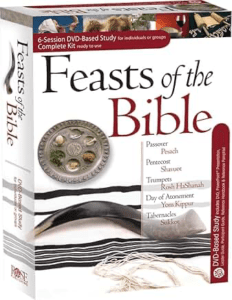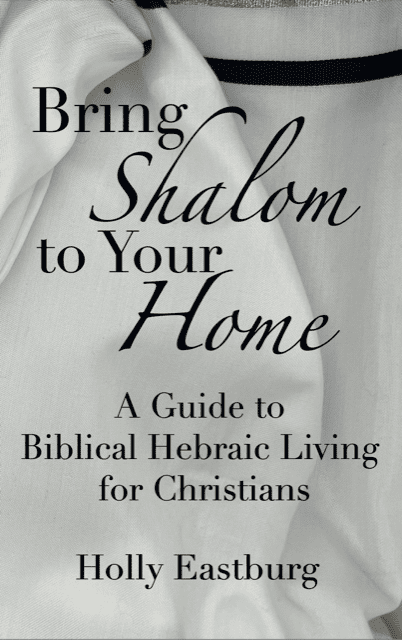
Yom Kippur: Fasting for Christians
Observing the Biblical Holy Days is a rich experience for Christians, and Yom Kippur is no exception. Most of us are familiar with the themes of atonement and repentance of this Feast Day.
But what about fasting? Traditionally, Yom Kippur is observed with a 25-hour fast. Do we have to fast to celebrate it? What are the benefits of fasting?
How is Fasting Related to Yom Kippur?

Yom Kippur is also known as the Day of Atonement. In the time of the Temple, it was a time to bring a sacrifice to atone for, or “cover,” sin. As Christians, we know that Jesus was the sacrifice that atoned for our sin once and for all! On Yom Kippur, we can both focus on repentance for sin and on our Savior, who took that sin upon himself on the cross.
The command for Yom Kippur in Leviticus 23:26-32 says to “humble your souls.” Humble can also be translated as “afflict.” While the Hebrew word used here could be translated a few different ways, all of them are unpleasant and uncomfortable, to the degree that even your soul is somehow involved in this significant discomfort.
So, while fasting isn’t directly commanded. It is an affliction that humbles and can even affect your soul. If you haven’t done it before, I’ll tell you – fasting is challenging! You have to set your mind against what your body desperately wants. It takes much discipline and is not much fun at all.
So that brings us to the question – why fast?
Benefits of Fasting for Christians
Despite how difficult and uncomfortable it is, there are significant benefits to our faith through fasting. While there are notable health benefits to fasting, that shouldn’t be the goal of a fast on Yom Kippur. The goal should be to achieve a state of humility and repentance, not to focus on the body but on the state of the heart.
It makes us want to cry out to God.
In our comfortable lives, we don’t often happen upon the times that make us desperately cry out to God. This lack of need is a blessing, of course, but it also keeps us in a state where we may not come before God in a weakened, humble state of need. Fasting removes one of the comforts we take for granted, and we can turn each hunger pang into a reminder to go before God in humble prayer.

It can improve our relationship with God.
As we respond to our hunger with prayer, we open a conversation that may have previously been one-sided, brief, inconsistent, or non-existent. The feeling of an empty stomach is a constant reminder of why we’re fasting and brings our focus back to God. Twenty-five hours of turning our attention toward Him humbly makes us better listeners. It can remove what was previously in the way of hearing what God wants to say to us so we can listen to Him more clearly.
It reminds us who our provider is.
Since most of us don’t regularly go without food or other necessities, we can forget where it comes from or credit ourselves with providing it. Fasting brings to mind just how blessed we are to have the option to eat when we’re hungry. God provides above and beyond what we need, and denying ourselves for a while puts that in perspective. Fasting is a humbling reminder that we come before a mighty God who always has our lives in His hands.
It brings out our spiritual side.
Throughout each day of our lives, we tend to our physical needs and wants. We bathe, rest, brush our teeth, apply lotions, etc. But an entire day of fasting causes us to turn on the physical and focus on the spiritual. One wise Jewish source said that we become like angels for a day since they don’t have physical needs like eating. Our stomachs tell us we need food, but we quiet them, acknowledging that we need God more.
Fasting on Yom Kippur can cause us to shift our focus from ourselves and our physical needs to our God and Savior. This Holy Day allows us to take a break from everyday life to humble ourselves before our great Provider. We use that time to repent of our sin and express gratitude for a Savior sacrificed to pay for it.
If you plan to observe Yom Kippur this year, check out the Holy Branches Calendar for the correct dates.





Shalom!
I am glad I found your website! I am one of the newbies trying to figure this stuff out and in seeking fellowship with like-minded believers, I have attended Messianic fellowship that follows Jewish customs closely and have become confused. I agree with Paula that we need to stick to what scripture says, but I see that you are simply explaining the differences and this is extremely helpful.
I struggle with understanding the calendar(s). My husband has attempted to base our observance dates according to his understanding of scripture, but it doesn’t line up with any of the calenders that others use. Do you have an article or insight to this topic?
Shalom, Nikki!
I agree the calendars can be confusing. I could recommend resources but I’ve found what you’re finding – there are disagreements between different sources. Even the Bible sometimes bases the timing on the harvests, which would be those in Israel and difficult for those around the world to know. I think those creating some calendars have taken things like this into account and have honestly attempted to be God-honoring in making a calendar for Believers to follow. I cannot tell you which is the perfect calendar to use but I will tell you that the calendar I use is the one from First Fruits of Zion. Here’s the link if you’re interested: https://ffoz.com/calendars/
I pray you find one you’re comfortable using to express your faith in a way that you can grow spiritually and ultimately closer to God! Blessings to you on your faith journey!
This is well written. However, the Torah Commands were given by YeHoVah GOD to the Hebrews AND the Strangers in the Camp! NOT the JEWS! Torah, the Book of Instructions IS HIS Kingdom Government for ALL of us to follow! There was NEVER suppose to be the divisions we have today. Please stay with what is written in Scripture! Judaism ADDS to and we have been Commanded to neither Add To nor Take Away from what is written. If it isn’t written in Scripture, it is a human being’s additions.
Yes, we are to fast. We are to FOLLLOW what Yeshua Messiah taught us and did until HIS return.
Be blessed to ALL who continue to seek His Will!
Shalom, Paula!
Thank you for visiting my website and for your thoughtful comments! My ministry is to Christians seeking beginner-level info on how to incorporate their Hebrew roots into their faith. I find that there’s a growing amount of info for those who’ve been on this path for a while but a striking lack of material for Christians just looking into it or starting in that direction. I’ve been called to minister to specifically this group and meet their needs in that area, explaining these topics simply, which is what I found so rare when I started down this path. While I do base the site’s info on Scripture, I also attempt to explain Jewish customs that are related to this faith as they will come across them on their journey, just as I have. I appreciate your insight in that area, as it’s important to distinguish what comes from the Word and what does not.
Blessings and a Chag Sameach to you!
Holly
Thank you for writing this! It is a good reminder of why we should fast and as I prepare my heart and mind for Yom Kippur.